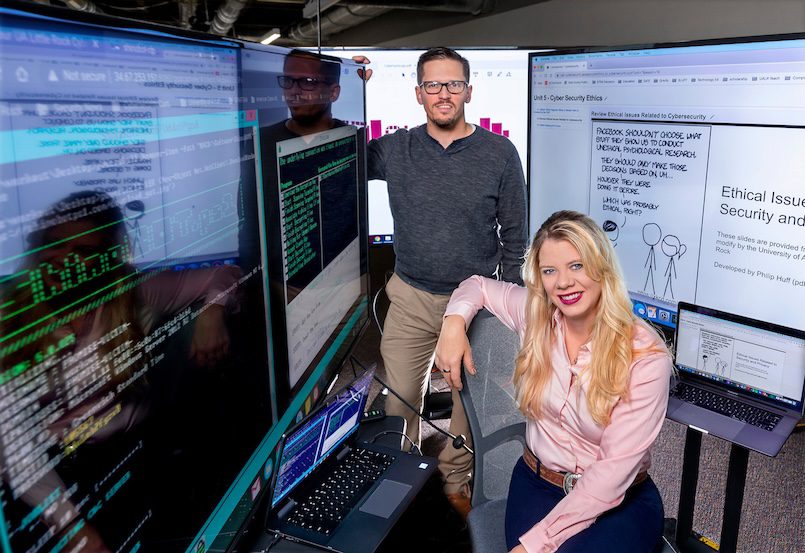17 Feb 2025 UA Little Rock secures $4.65 million grant to advance cybersecurity education
The University of Arkansas at Little Rock continues to strengthen its position as a national leader in cybersecurity education with the award of a $4.65 million grant to expand cybersecurity learning opportunities nationwide.

“We are committed to leading the charge in cybersecurity education,” said Chancellor Christina S. Drale. “By growing the number of teachers with the skills and resources they need to inspire the next generation, we’re not only addressing a critical workforce gap but also positioning Arkansas as a hub for innovation in cybersecurity. This grant supports a transformative step forward for education and industry alike.”
The grant, funded by the National Centers of Academic Excellence in Cybersecurity (NCAE-C) within the National Security Agency, will enable UA Little Rock to enhance its groundbreaking efforts in preparing high school teachers to teach cybersecurity.
UA Little Rock will collaborate with academic partners DePaul University and the University of Louisville, as well as Dark Enterprises, a nonprofit advancing cybersecurity education. The grant’s principal investigators are Dr. Sandra Leiterman, cybersecurity education research professor, and Dr. Philip Huff, associate professor of cybersecurity.
“This funding will allow us to build upon the success of the National Cybersecurity Teaching Academy (NCTA) and help address the nationwide shortage of high school cybersecurity teachers,” Leiterman said. “We have 175 scholarships available for teachers for the upcoming summer cohort and an additional 175 for the summer 2026 cohort. This grant enables us to make a meaningful impact by increasing the number of skilled cybersecurity teachers in classrooms in Arkansas and across the country.”
The grant marks the third major award supporting the NCTA, a graduate certificate program that equips high school teachers to teach cybersecurity. UA Little Rock was among the first institutions in the nation to offer a graduate certificate in cybersecurity education, which also qualifies teachers to teach concurrent enrollment cybersecurity courses. This provides more opportunities for high school students to earn college credits and shorten their pathway to earning their college degree.
The new funding will also expand the NCTA to five additional institutions: Worcester Polytechnic Institute, University of Arizona, Dakota State University, Sacramento State, and the University of Maryland Global Campus.

For teachers seeking to further their education, UA Little Rock’s Department of Computer Science and School of Education have developed new pathways. NCTA graduates can pursue a Master of Education at UA Little Rock, and a program for pre-service teachers is in development.
“As the liaison between the computer science and education departments, I am proud to support the creation of a new pathway providing in-service teachers with 18 credit hours in cybersecurity,” said Dr. Lundon Pinneo, assistant professor of education. “This initiative empowers teachers to take on leadership roles in their schools while increasing opportunities for high school students to earn concurrent college credit. Additionally, I am collaborating with Drs. Leiterman and Huff to design an early-entry option for pre-service teachers pursuing a master’s degree, further enriching teacher preparation and advancement.”
The grant also provides funding to establish a learning community for NCTA graduates, offering professional development and peer support.
“I recently met with 40 of our graduates at a K-12 Cybersecurity Conference in San Antonio,” Leiterman said. “Many of them are the sole cybersecurity teachers in their schools and lack local support networks. This grant allows us to build an alumni community where teachers can connect quarterly, access professional development, and share successful lessons. We want them to become a valuable resource for one another.”
Huff underscored the importance of fostering a collaborative learning environment.
“Our goal is to create a community of educators who not only feel confident teaching cybersecurity but are also empowered to inspire their students to pursue careers in this critical field,” Huff said. “By supporting these teachers, we’re building the foundation for a stronger and more secure future.”
Arkansas educators like Brad Goodnight are already benefiting from the NCTA program. A computer science teacher at Morrilton High School, Goodnight earned his licensure to teach computer science through the Arkansas Cybersecurity Teaching Academy, an earlier grant-funded initiative tailored for Arkansas teachers. After completing the graduate certificate program in December 2024, Goodnight is eager to begin teaching concurrent enrollment cybersecurity classes.
“If your school needs to develop a cybersecurity curriculum, the NCTA team will stop at nothing to support teachers and students,” Goodnight said. “The classes are challenging, and the instructors are responsive and supportive. Taking concurrent enrollment classes in cybersecurity is a life-changing opportunity for my students. Programs like the NCTA are making a big difference for teachers and students across Arkansas. I trust UA Little Rock because they are leading the conversation on cybersecurity education in Arkansas.”
Teachers who are interested in learning more about the NCTA can visit this website.








